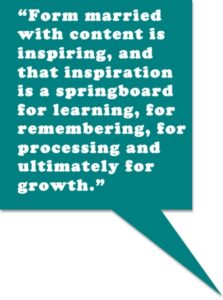See a photo of Corey, a link to his bio, Part 1 of this Q&A, and Part 2, and Part 3.
Q&A with Corey Blake (Questions 4 and 5):
Q: What future trends or directions do you foresee for story/storytelling/narrative?
A: With so much information accessible, I am a true believer that what has lasting impact is information delivered through some kind of story/performance. Otherwise, it is just content, and content without form is nothing more than information that goes in one ear and out the other. But form married with content is inspiring, and that inspiration is a springboard for learning, for remembering, for processing and ultimately for growth. I’m seeing more businesses turn to storytelling, and that tells me a ton about where we’re headed. Businesses often come to our company and show us the “information” they have been sharing with potential clients. We help them turn that into story that emotionally engages people and attracts new business. People nowadays want to be included in an experience. Good storytelling considers the audience as a player in the story. So while I believe that the publishing industry is falling apart, I also believe that storytelling itself is on the rise.
 Q: Your company, Writers of the Round Table Inc., specializes in exceptionally written content. How does storytelling fit into that equation?
Q: Your company, Writers of the Round Table Inc., specializes in exceptionally written content. How does storytelling fit into that equation?
A: My belief is that exceptional content is a marriage of information and emotional engagement. Reading is an emotional experience; and if it isn’t, people will go off in search of writing that stirs something within them. That being said, we have a filmmaker’s approach to book writing (collaboration) and a storyteller’s approach to business writing. When I founded the company early in 2006, we started by fulfilling short-term writing assignments and built the business around them (Web copy, press releases, eBooks, articles, white papers). Clients continued to pour into the system, and some of them were looking to write books, so we naturally progressed into that area simultaneously. But everything we do is fueled by story. A business has a story it is trying to communicate. If a company or individual is saying the same thing over and over again, we get bored and tune out. But if someone reels us into a hero’s journey that we feel we are participating in, we not only root for them, we start to get on the train and become part of that success. Why? Because ultimately, our stories are all interconnected. But we need help to tell our stories in a way that engages one another. That’s why people come to us. They know they have the story, but they do not have the ability to string together the words that will evoke the proper emotion.
